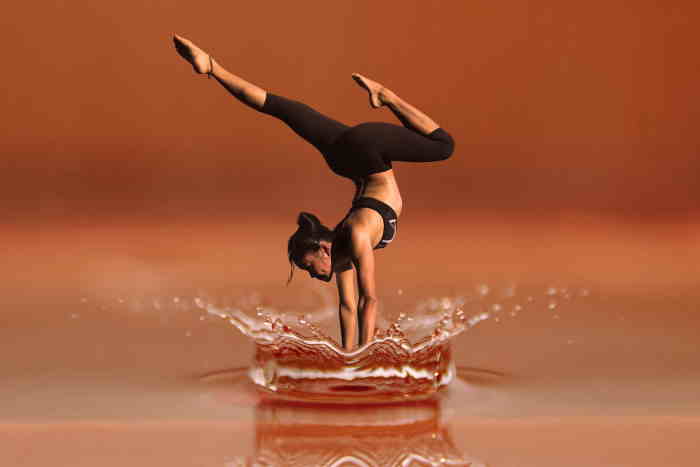- You are here:
- Home »
- Blog »
- Dive Deeper »
- Freediving and Yoga – A Match Made in Heaven?
Freediving and Yoga – A Match Made in Heaven?


Yoga and freediving are two common forms of exercise that strengthen the mind and body simultaneously. While yoga and freediving are very different activities, they share several traits in common. Yoga and freediving require that you have mental strength as well as being physically fit, which is unusual with exercise.
When properly applied, yoga can be used to enhance the abilities of freedivers through increased stamina and lung capacity. Freediving is a sport that requires diving into the depths of the sea without the benefit of a breathing apparatus, making the benefits of yoga very fitting for freedivers.
This article will discuss the health benefits and risks of yoga and freediving and how they’re similar. Keep reading as I go into more detail about these sports.
What Is Freediving?
Freediving is the act of diving underwater and holding one’s breath without using an oxygen tank. Essentially, anyone who jumps into a swimming pool or dives into the ocean without snorkeling or scuba gear is freediving. Freediving is especially popular in Thailand, Greece, and France.
There are many different types of freediving performed in all kinds of water.
As a sport, freediving has become both competitive and famous due to the extreme challenges involved. Masks, goggles, and fins can be worn by freedivers, allowing them to propel ever deeper into the abyss.
The main distinguishing factor between free divers and other deepwater swimmers is that free divers don’t use breathing gear, as it’s all about breath-holding.
A Brief Overview of Freediving
Initially used for fishing, collecting pearls and other valuables, and boat cleaning, freediving has evolved into a competitive sport. It was first used as a form of military training taught by the Navy in the 1960s to escape sunken submarines.
In the 1970s and ’80s, freediving began to take to a competitive sport and was recorded.
Health Benefits Associated With Freediving
Many health benefits are associated with freediving. Listed below are a few of these benefits.
It Can Improve Mental Health and Lower Stress
Much like yoga, freediving emphasizes regulating your breathing and managing your heart rate. The only way to be a good free diver is to perfect these skills, and doing so can boost your mental strength and lower your stress levels.
It Allows for Better Blood Oxygen Levels Control
When you exercise a specific muscle, it becomes more robust and more fit. The same thing happens when you freedive in that your body learns how to conserve oxygen.
Humans are mammals, and all mammals have a reflex known as the mammalian dive reflex.
This reflex allows your body to optimize respiration instinctively, regulate your heart rate, and send oxygen to whatever part of the body needs it most. Ultimately, freediving will help your body preserve and utilize oxygen better than those who don’t.
Your Body Becomes More Flexible
Freediving requires you to hold your breath for long periods, which improves the flexibility of your thoracic region. This also means that your back and neck will become more flexible and less prone to pain and injury.
In addition, the weight of the water is evenly dispersed over your entire body, which is excellent for your joints. This water distribution reduces swelling and pain in your knees, ankles, and other parts of your body.
It Stimulates Neurotransmitters Positively
Any time you workout, your body releases adrenaline, dopamine, and noradrenaline. These neurotransmitters give your body a relaxed and feel-good feeling that boosts your overall mood and reduces stress – which can all be released when freediving. Additionally, freediving will improve your overall physique and fitness level, which will, in turn, increase your self-confidence and discipline.
It is not possible to be a successful free diver without having excellent physical condition and self-discipline.
Risks Associated With Freediving
Unlike yoga, freediving is a hazardous sport when not done correctly.
It’s essential to know your limits and not push yourself beyond the point of no return. Anytime you’re in or near water, there’s a risk of drowning. Below are reasons freediving can be dangerous:
- Freediving is especially dangerous due to the extreme depths that divers go to. Know your limits and never dive deeper than the depth you can handle.
- It involves returning to the surface too quickly. This is known as the bends or decompression sickness (DCS), and symptoms can range from mild to life-threatening. The best way to avoid falling prey to DCS is by training with a qualified freediving instructor and have them show you the best freediving methods.
What Is Yoga?

Yoga is a form of exercise that combines meditation, stretching, endurance training, and mental strengthening. Many people are drawn to yoga because it suits various age groups. Yoga also connects people to their bodies, helping them cultivate self-love and mindfulness.
As yoga has gained popularity, it has also taken on many different forms, such as “hot yoga” and Tai-Chi. While Tai-Chi is similar to yoga in many ways, it differs in that it’s actually a martial art rather than a type of yoga.
Yoga can be peaceful and relaxing, or it can be a physically demanding workout. It all depends on what you want to get out of it.
Health Benefits of Yoga
Many people believe that yoga has many health benefits. Below are ways that yoga can benefit your health:
- It promotes stronger muscle tone. Your muscles will inevitably become stronger and more toned because of the rigorous stances and poses required by more intense forms of yoga. Those who do yoga often have to hold poses that stress both their arms and legs, allowing them to become much more robust.
- Yoga can help fight smoking or drinking habits. You must be tough mentally when doing yoga stretches and keep going even when your muscles feel like giving up. This kind of mental strength has helped people quit smoking and drinking.
- Yoga can improve mood and mental sharpness by enhancing the hormones that allow you to think clearly.
It relieves stress and is an overall relaxant. In addition to relieving stress, yoga has also been shown to help people lose weight. - It helps relieve the symptoms of menopause. Yoga has been shown to ease some of the symptoms of menopause. Women who do yoga have fewer hot flashes and also suffer fewer mood swings and depression.
- It has been shown to work as a pain reliever. Yoga has been proven to relieve certain types of pain, including low-back pain, headaches, neck pain, and knee pain.
Risks Involved in Practicing Yoga
Like all forms of physical exercise, there are a few risks involved with yoga, such as sprains and strains.
Yoga isn’t a high-impact workout, so the risk of injury is much lower than other forms of exercise, but it’s still possible. With proper training and monitoring from a qualified yoga instructor, injuries are less likely.
Most yoga injuries occur from one attempting certain poses on their own without proper supervision. The risk of injury also increases with age, as those over 65 suffer most yoga injuries.
If you have any health issues that could worsen by physical activity, consult your doctor and yoga instructor before doing yoga.
Final Thoughts
Yoga and freediving are both meant to be forms of exercise that improve overall physical and mental health. Both have been shown to reduce stress, anxiety, depression, pain, and many other things humans have lived with for so long. With proper training and technique from a qualified instructor, either one of these practices can help you lead a better and healthier life.
About the Author Gerrie van Niekerk - Apnealogy
Gerrie is a passionate Freediver, Spearfisher, Digital Marketer, and author for the Apnealogy website. Gerrie is an SSI Level 1 certified Freediver who loves geeking out about freediving and spearfishing gear and lives for his family and adventure.

